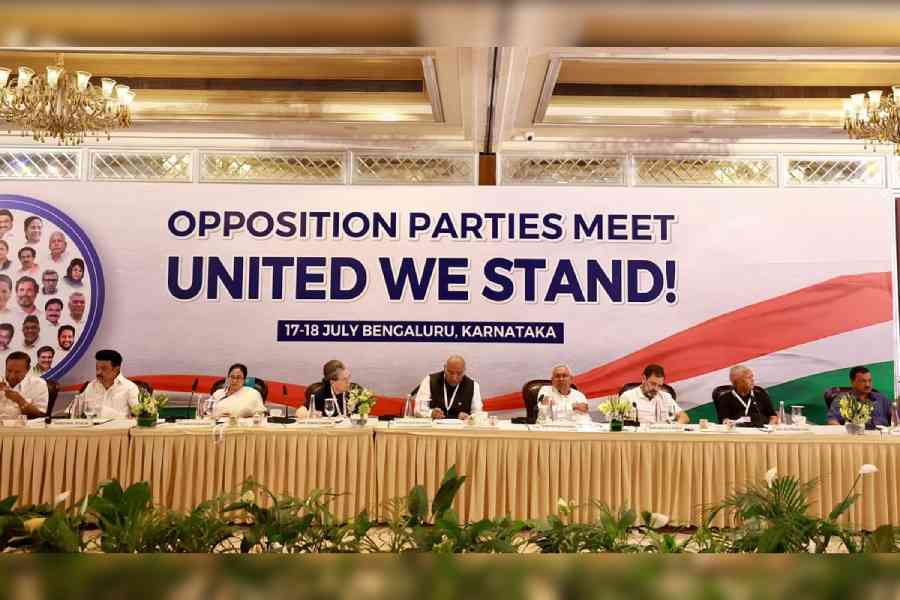- Mamata Banerjee meets Amitabh Bachchan in Mumbai, says he is Bharat Ratna for her, reports PTI
On Wednesday evening, Bengal chief minister Mamata Banerjee is scheduled to meet Amitabh Bachchan at his home in Mumbai. But later on, when she leaves Jalsa, the actor's family residence in Juhu, for her hotel in Nariman Point some 20 km away, she is likely to have more on her mind than just the warm memories of a Raksha Bandhan evening well spent with arguably the first family of the Bollywood.
That’s because Didi knows better than most that the two-day meeting of the national Opposition conglomerate INDIA in Mumbai, jointly hosted by the Maharashtra’s Opposition Maha Vikas Aghadi – the Congress, Shiv Sena (UBT) and NCP --beginning Thursday is where things get real for the diversely opinionated parties who have, so far, revealed little about common political strategies and programmes besides their common detest for the BJP.
With elections round the corner in the three states of Chhattisgarh, Madhya Pradesh and Rajasthan where constituents of INDIA, especially the Congress, have high stakes, the need to quickly go back to the drawing board and thrash out a working seat sharing formula and pinpoint campaign strategies are the Opposition's need of the hour. The Mumbai meet, leaders confirm, would be the launch pad for both despite some rough edges that are already visible within the platform.
The launch of a logo of the Opposition bloc with a tagline on patriotism and possibly also a theme song could be unveiled at the scheduled grand dinner on Thursday even before formal deliberations start, sources said. But beyond these optics, their importance notwithstanding, the senior leadership of parties seems focused on straightening a few things out before the alliance hits the ground in the poll-bound states.
The first task is to finalise names of the 11-member coordination committee, announced by the 26-party ruling coalition at its Bengaluru conclave in July. No such guarantee, though, on whether a convenor of that committee would be named.
“Naming a convenor could provide a weapon in the hands of the BJP which would immediately project the person as the Opposition’s prime ministerial candidate and pit him against Narendra Modi. Strategically, we would not want that to happen at this stage,” a leader, scheduled to participate in the Mumbai meet, said.
Amid speculation that JD(U) chief Nitish Kumar, who has been spearheading the task of coordination among constituents of the bloc and a few parties outside as well, could be named convenor, the leader has already officially expressed his reluctance to accept the position on grounds that he is “not driven by personal ambitions”.
The eventuality of Kumar being named a member of the committee could, in that case, lead to getting its configuration changed from the now-settled second-rung leadership of parties to the top brass of INDIA constituents to stamp out disparity within the committee, it was reliably learnt.
Leaders also did not rule out the possibility of fresh inductions in the anti-BJP alliance at the Mumbai conclave. Kumar’s liaison with NDA partners like the Shiromani Akali Dal in Punjab and Om Prakash Chautala’s Indian national Lok Dal in Haryana are, by extension, the top names under speculation.
A senior Trinamul Congress leader, however, confirmed that on the agenda of the Mumbai meet is the formation of additional subcommittees. “We are expecting some four-five sub-committees to be finalised. They would include formation of a committee to determine our campaign policy in states and another committee to determine our communication strategies, both digital and offline,” the leader said.
The Manipur issue which dominated Parliament and merged into a stormy no-confidence debate in the recently concluded Monsoon Session seems to have provided a shot in the arm for the Opposition. “We have had some great floor coordination in both houses of Parliament between July 20 and August 11. Though, on the face of it, the Mumbai meeting is the third official meeting of the conclave, for practical purposes it’s the fourth. That’s because the third coordination meeting of Opposition parties was successfully tried and tested in Parliament,” a leader, sounding upbeat, maintained.
Political observers feel that more than clinching seat sharing arrangements across states, the Mumbai meet would focus on finalising the broader contours of a policy-based unity.
Asked whether the problematic inter-party relationships in regions like Bengal and Delhi would come up for discussion, a highly placed source scheduled to attend the meeting said: “We are expecting to clinch policy outlines on issues like farmers, employment, communalism and federalism to be discussed threadbare at the meet. As for seat sharing, a broad understanding has already been reached which authorizes the strongest party in each state to take the call. We will cross that bridge only when we come to it.”











